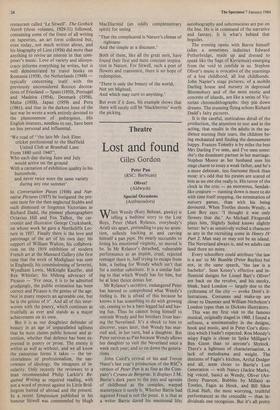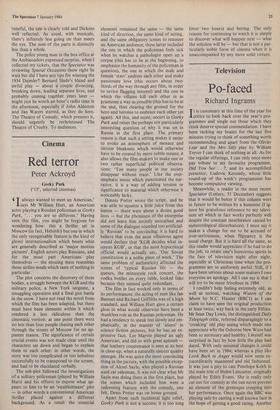Theatre
Lost and found
Giles Gordon
Peter Pan
(RSC: Barbican)
Oliver! (Aldwych) Special Occasions (Ambassadors)
when Wendy (Katy Behean, gawky) is telling a bedtime story to the Lost Boys, Peter (Mark Rylance, everybody's Ariel) sits apart, pretending to pay no atten- tion, sullenly hacking at and carving himself a pan pipe. He nearly succumbs to losing his emotional virginity, so moved is he. In Mr Rylance's detached, vulnerable performance as an impish, cruel, rejected teenager there is, half trying to escape from him, a feeling for Wendy which isn't that for a mother substitute. It is a similar feel- ing to that which Wendy has for him, but he at least thrice denies her.
Mr Rylance's secretive, endangered Peter has learned to comprehend what Wendy's feeling is. He is afraid of this because he knows it has something to do with growing up, ceasing to be a bare-legged lad and hav- ing fun. Thus he cannot bring himself to restrain Wendy and her brothers from leav- ing the Neverland. It's a shock to him to discover, years later, that Wendy has mar- ried and, in her turn, had a daughter. But Peter survives as Pan because Wendy allows her daughter to visit the Neverland once a week each year; and so on down the genera- tions.
John Caird's revival of his and Trevor Nunn's last year's production of the RSC's version of Peter Pan is as fine as the Com- pany's Cyrano de Bergerac. It displays J.M. Barrie's dark paen to the joys and agonies of childhood as the complex, warped masterpiece it surely is. Whether Barrie had ingested Freud is not the point. It is that as a writer Barrie dared his emotional life;
autobiography and subconscious are put on the line. He is in command of the narrative and fantasy. It is what's behind that beguiles.
The evening opens with Barrie himself (alias a sometimes indistinct Edward Petherbridge, made up and dressed to speak like the Sage of Kirriemuir) emerging from the void to confide in us. Stephen Oliver's music is evocative of the yearnings of a lost childhood, all lost childhoods. John Napier's stage pictures, of a mobile Darling house and nursery in depressed Bloomsbury and of the most exotic and concrete of islands, are like a series of Vic- torian chromolithographs: they pin down dreams. The stunning flying echoes Richard Dadd's fairy pictures.
It is the careful, meticulous detail of the production, the attention to text and in the acting, that results in the adults in the au- dience nursing their tears, the children be- ing enchanted and finding the denouement happy. Frances Tomelty is by miles the best Mrs Darling I've seen, and I've seen some: she's the dominant partner in her marriage. Stephen Moore as her husband uses his stage charm to essay a weak father, and he's a more debonair, less fearsome Hook than most: it's odd that his pirates are scared of him as no one else really is. His terror of the clock in the croc — an enormous, Sendak- like creature — running down is more to do with time itself stopping, the termination of nursery games, than with his being devoured. When Tootles shoots Wendy, a Lost Boy says: `I thought it was only flowers that die.' As Michael Fitzgerald plays him, Slightly Soiled knows slightly better: he's as sensitively etched a character as any in the recruiting scene in Henry IV Part 2. Man may or may not be an island. The Neverland always is, and we adults can land there no more.
Every schoolboy could attribute 'the law is a ass' to Mr Bumble (Peter Bayliss) but not, in the same speech, 'the law is a bachelor'. Sean Kenny's effective and in- fluential designs for Lionel Bart's Oliver! are back on the revolve, and his smoky, bleak, hard London — largely due to the cyclorama of the city — evoke Dore's il- lustrations. Costumes and make-up are closer to Daumier and William Nicholson's London types than to Dickens illustrators.
This was my first visit to the famous musical, originally staged in 1960. I found a softness, a sentimentality in the designs, book and music, and in Peter Coe's direc- tion which I hadn't expected. Ron Moody's wispy Fagin is closer to Spike Milligan's Ben Gunn than to anyone's Shylock. There's a lightness of characterisation, a lack of melodrama and weight. The denizens of Fagin's kitchen, Artful Dodger and all, seem closer to Barrie's Lost Generation — with Nancy (Jackie Marks, big voiced, basic) as Wendy, Oliver (An- thony Pearson, Bubbles by Millais) as Tootles, Fagin as Hook, and Bill Sikes (Linal Haft, the most worrying, truthful performance) as the crocodile — than in- dividuals one recognises. But it's all pretty tuneful, the tale is clearly told and Dickens well reflected. As usual, with musicals, there's infinitely less going on than meets the eye. The sum of the parts is distinctly less than a whole.
The polite young man in the box office at the Ambassadors expressed surprise, when I collected my tickets, that the Spectator was reviewing Special Occasions (how right he was) but did I have any tips for winning the 1934 Daimler? Bernard Slade's bland and awful play — about a couple divorcing, breaking down, leading separate lives, and probably coming together years later might just be worth an hour's radio time in the afternoon, especially if John Alderton and Jan Waters starred, as they do here. The Theatre of Comedy, which presents it, should urgently be rechristened The Theatre of Cruelty. To audiences.



































 Previous page
Previous page